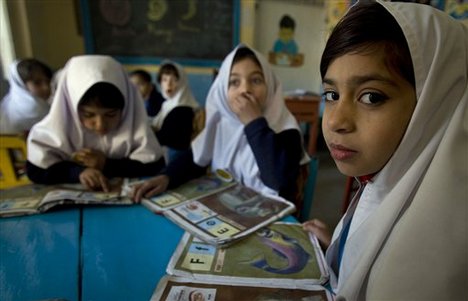
UNICEF promotes good education for girls and boys. It also recognizes that a special effort is required on behalf of girls, who're usually more marginalized and disadvantaged. Starting in 1999, in Afghanistan, UNICEF took the brave step to start homeschooling for girls and boys since girls were not allowed to attend public school. Nearing the end of 2001, homeschooling reached 58,000 Afghan children. In Ethiopia, UNICEF outreached and teacher training created a 14% increase in girls enrolling in primary school. In Syrian Arab Republic, about 3,000 teen girls joined in ‘Back to School’ classes, providing unfortunate girls with basic education in half the usual time.
The MDGs, are now widely accepted as universal benchmarks for measuring progress globally in development, promise education (primary) to all the world’s children by 2015. They also aim to eliminate sexism in primary & secondary education completely by 2015. this charity’s approach requires advocacy at the highest levels of government. Advocacy among partners and national officials to make girls’ education a priority in sector plans; mobilization communities and institutions to implement acceleration measures. The safeguarding of quality to avoid setbacks in future time; and strong local participation to advertise ownership and sustainability. It means anticipating the consequences of acceleration and planning accordingly, in terms of facilities, staffing, recurrent costs and management.
OMG MR. SAUER SAID NO UNICEF! OUR FATHER LACOMBE SCHOOL CANNOT BE IN BUSINESS WITH UNICEF. OMG OMG OMG. I'M PISSED. I BLOGGED A BILLION ON IT. WHATEVER! I'M KEEPING IT HERE. OMG. I ASKED WHY NOT AND HE SAID 'I'M NOT SURE' OMG I GOOGLED AND AND IT DIDN'T HELP. AWE MAN. UNICEF WAS THE ONLY ORGANIZATION I FOUND THAT ACTUALLY WORKED TOWARD GETTING HAITI A BETTER EDUCATION. ONE THAT FITS PERFECTLY
WITH MY MDG )': I'M SAD. BUT 'SAVE THE CHILDREN' WAS MY NEXT CHOICE. I think save the children in okay since when I was talking to a representative, they told me that 'Save the children' works toward getting schools in some countries like Ethiopia. AI YA, I'M ANGRY. I FELL IN LOVE WITH UNICEF AND NOW I CAN'T USE IT.... *sniff* *sniff*



No comments:
Post a Comment